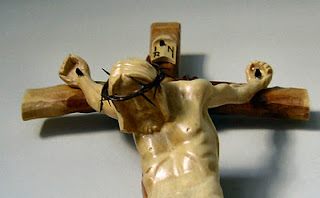 As we approach today’s readings I think we all have a much clearer, more vivid sense of how it is a single Event can change our entire world so that there is simply no going back to what we once knew and perhaps even took for granted. We know what it is like to have our usual assumptions and expectations upended, to have everyday routines and priorities thrown into disarray, and -- at least for the time being -- --- to have been robbed of many of the things that gave our lives value and purpose including relationships, school, work, and even forms of ministry and ways of "being Church".
As we approach today’s readings I think we all have a much clearer, more vivid sense of how it is a single Event can change our entire world so that there is simply no going back to what we once knew and perhaps even took for granted. We know what it is like to have our usual assumptions and expectations upended, to have everyday routines and priorities thrown into disarray, and -- at least for the time being -- --- to have been robbed of many of the things that gave our lives value and purpose including relationships, school, work, and even forms of ministry and ways of "being Church".
Retelling the Story:
Today's gospel lection is meant to speak to people in precisely our predicament. I would like to retell it in a way that, I hope, will let us hear it afresh. These disciples have experienced the arrest, brutalization, and execution of a Man whom they loved, followed, and trusted in, a man whom they thought held the key to any real future. But the One they thought was God's own anointed one and their hope for a new and meaningful world, was instead determined to be a godless and godforsaken blasphemer and political terrorist. He was executed in the most shameful way possible --- a way which underscored the lie his life must really have been --- and his last cry from the cross was one which pleaded with the God of Israel who had apparently also abandoned him. Like us, these disciples had experienced a world-shattering loss.
On the road to Emmaus we find them disoriented and fearful as they make their way home where they will shelter in place -- in hiding from the authorities who will be coming for them as well. On the way they take some comfort from the keenness of their confusion and pain in conversation and debate --- yes, about the events in Jerusalem, but also they talk about the Jewish Scriptures and what they have taught and promised. Perhaps some of these stories, stories they have lived with and from their whole lives, can ease their grief a little and make sense of the tragedy they have just suffered. After all, God has been with his People in the past. Surely he will continue with them even now, even now in their devastation. When they meet a stranger who wonders why they are so distraught, so angry and uncertain, we can hear the edge in their response: "What!? Have you been living in a hole somewhere? Are you the only one in the entire civilized world who does not know what happened in Jerusalem?!! We were so sure he was God's chosen. . . ; and, God forgive us, we were so wrong!! The One we thought was God's own Messiah was convicted by our own religious leaders and [shudder] crucified by the Romans. We know now therefore, he could not have been the one we hoped for. The God he supposedly "revealed" and taught us to believe in was powerless to save him -- or cursed him for his blasphemy; the kingdom he proclaimed as being at hand, the realm of his God's putative "sovereignty", was apparently just another lie!!
When they meet a stranger who wonders why they are so distraught, so angry and uncertain, we can hear the edge in their response: "What!? Have you been living in a hole somewhere? Are you the only one in the entire civilized world who does not know what happened in Jerusalem?!! We were so sure he was God's chosen. . . ; and, God forgive us, we were so wrong!! The One we thought was God's own Messiah was convicted by our own religious leaders and [shudder] crucified by the Romans. We know now therefore, he could not have been the one we hoped for. The God he supposedly "revealed" and taught us to believe in was powerless to save him -- or cursed him for his blasphemy; the kingdom he proclaimed as being at hand, the realm of his God's putative "sovereignty", was apparently just another lie!!
A bit further along the road they continue to fill the stranger in on what he seems to have missed. We can hear their anger and their anguish: "You know, some women from our group told us Jesus was really alive (we had not seen the crucifixion ourselves), and they recounted stories of meeting angels --- Foolish Women! You know what kind of witnesses they make! When we checked out their story others from our group found only an empty tomb --- no heavenly messengers, no Jesus alive and well (or even alive and battered), not even his dead body --- just an empty tomb!! Some are saying the Romans stole the body to prevent the grave from becoming a focus for a martyr cult. The Romans claim we did it for the same reason. Maybe it's true that the crucifixion of an apparently-unbalanced Galilean peasant changed very little in the world at large --- but God help us!! Nothing at all is the same now. What are we to do??
In today's pandemic we face a similar journey and we know the road in front of us is long. There are great difficulties and uncertainties; neither are there easy or facile answers to the questions which haunt us. Nor, on the road to Emmaus, does the stranger provide facile answers to the desperate questions the disciples there both ask and are. Instead, he continues to accompany them on their journey. He is and remains with them. He listens and continues to listen as they pour out their hearts to him: bewilderment, anger, shattered hopes, fragile faith, and sorrow, such immense sorrow -- he receives them all. And he challenges them rather sharply, in fact, to greater faith and continuing trust. Especially he reminds them of their scriptures and the way God has worked throughout their history.
Eventually, in a shared meal they watch and listen as he takes bread, blesses and breaks it with and for them. And in that moment, they SEE! They KNOW! The God of Jesus, the God of the Christ has been victorious over death and death-dealing powers. He has made them his own and they are irretrievably changed by his presence. Everything Jesus told them was, no, IS true!! He has been vindicated by God, and even more astonishingly, he has been raised to new life --- not at the end of time or at the end of the world --- but right here and now in the midst of human history! Heaven, the word we use for God's own life shared with others, has broken in on and is remaking the old world into a New Creation. Nothing at all can separate us from God's love -- not crucifixion, not godless death, and certainly not pandemic. In light of all this, the disciples now see with new eyes and celebrate the truth they lamented just a short time before: NOTHING AT ALL is or will ever be the same again.
On Our Own Road to Emmaus Today:
During this time of finding our way on a disorienting and painful journey, and especially as we find new ways to "be Church" when ordained clergy have been made relatively ineffective, this gospel story tells us one main story: we are being accompanied by the Crucified Christ even when we fail to recognize him and it is imperative that we learn to recognize and come to know him if we are to be people of genuine Hope. One of the reasons this gospel lection is critical for us this Easter especially is because it is clear he is not only to be found in Church, nor is he recognized only in the Scriptures as they are read there, nor only in the Eucharist itself. Because ours is an incarnational God who has sundered the veil between sacred and profane, and because, similarly, our faith is a sacramental one, the One who accompanies us -- often unrecognized -- is found in the unexpected and even in what we might deem the unacceptable place. Sister Macrina Wiederkehr, OSB, who died just last Friday**, said it this way:
Especially it asks that we make of these, places of prayer and that we become people who regularly pour out our hearts to the God who receives us in every situation. It asks that we make our homes places where the Scriptures are read and reflected on so that our stories and those of our ancestors in faith become inextricable and God is allowed to pour himself out to us as we learn to receive him. And finally, it asks that we allow our homes to become places where the meals we eat are taken together joyfully, and attentively as we allow them to become something Eucharistic despite not being the Eucharist itself. After all, the Lord was with his disciples as they fled Jerusalem for home; He did not abandon or disdain the disciples at any point on the road to Emmaus. He will accompany us in the same way if we will only take the steps needed to encounter and recognize him! Amen.
________________________________________
**N.B., Sister Macrina Wiederkehr, OSB wrote 8 wonderful books on spirituality. One powerful theme was finding God in the ordinary and another was living in the present moment (as an ever-flowing grace empowers us to do). The quote above is taken from A Treeful of Angels. Macrina died on 24. April. 2020 of a brain tumor. Condolences to her Sisters at St Scholastica Monastery, Fort Smith, AR. She has left the home she loved to return to the one for which she most deeply yearned. Alleluia!



























.jpg)







































